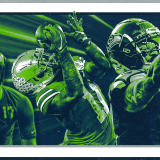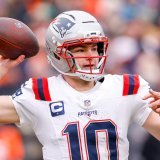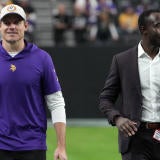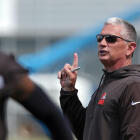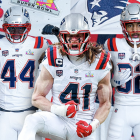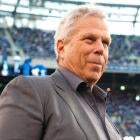As affordable QBs outshine the highest paid, should NFL teams change their approach? The answer is complicated
A deep dive into big-money vs. lower-cost signal-callers
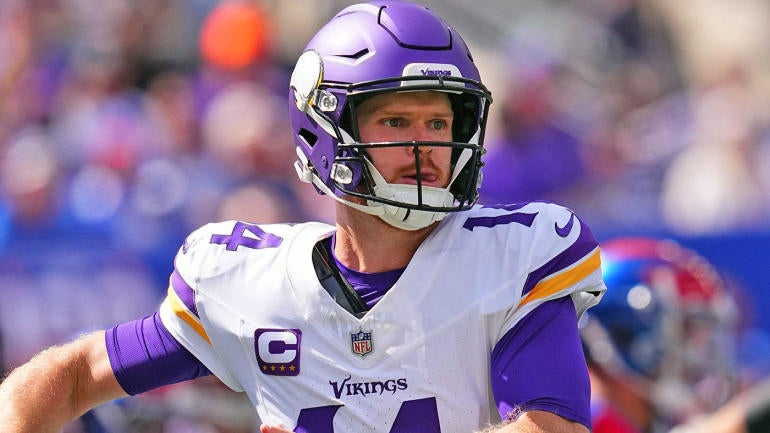
The early story of the 2024 NFL season has been the dominance of the underdog: Few could've anticipated teams like the Minnesota Vikings and Pittsburgh Steelers keeping pace with the reigning Super Bowl champion Kansas City Chiefs, leaving Week 3 with spotless records. Even fewer could've foreseen the quarterback play that's accompanied such unexpected success, with castoffs like Justin Fields and Sam Darnold excelling.
Contrast this stardom of the journeymen with more mercurial results for high-profile signal-callers like Patrick Mahomes and Jalen Hurts, who've combined for eight picks in three weeks; or Trevor Lawrence and Deshaun Watson, who've struggled to hit even 50% of their throws, and it's no wonder some might be wondering if big-money quarterbacks are even worth the investment.
Consider Fields, who along with veteran Russell Wilson commands just 10% of what every other team in the AFC North pay for their quarterbacks, according to SportsLine. If the Bengals only had to pay $5 million for a starter, they would've likely already secured top wideouts Ja'Marr Chase and Tee Higgins to long-term deals. The Browns might've just run it back with Joe Flacco if they could've reallocated Watson's hefty salary to the offensive line.
But these are just hypotheticals, and flawed ones at that; who's to say Chase and Higgins are putting pen to paper with Cincy if, say, a one-year rental had been the grand plan at quarterback rather than the trusty-when-healthy Joe Burrow? And after the Bengals' 0-3 start, it's fairly apparent that Burrow and Chase aren't the primary issues.
A better question is: What do the broader facts say on the matter?
There isn't a clean delineation point when sorting the "highest-paid" quarterbacks considering how often the market shifts with each new deal, but let's just take the top 10 to start, based on average earned per year. Through three weeks of the 2024 season, the top 10 active highest-paid quarterbacks have a combined record of 10-18. The 11th-20th highest paid, meanwhile, are a combined 22-11. So if you want to argue that the "mid-tier" starters are providing more bang for their buck to start this fall, you'd be correct.
This is also an extremely small sample size. Is it possible the mid-tier overachievers -- think Darnold, Fields, Baker Mayfield, Derek Carr, Geno Smith -- are benefiting from better situations? Certainly. That's the initial point of the whole discussion. These lesser-salaried veterans are faring better, the reasoning goes, precisely because their teams can afford to spend money elsewhere. The Vikings can afford Justin Jefferson and a restocked defense for Brian Flores. The Steelers can afford T.J. Watt and a loaded linebacker corps for Mike Tomlin. The Buccaneers can afford Mike Evans, Tristan Wirfs, Antoine Winfield Jr. And on and on.
Except that still doesn't tell the whole picture. Some contenders with higher-paid quarterbacks -- the Chiefs with Mahomes, the Philadelphia Eagles with Hurts, etc. -- still spend more than most. Both Philly and K.C. rank in the top 10 in 2024 cash spending, per Spotrac, and both have also parlayed such lucrative activity into recent Super Bowl appearances. Expand this wider perspective to the last 20 years of Super Bowl-winning quarterbacks, and you find a near-even split when it comes to elite versus mid-tier salary-cap hits at the position.
Note: Salary cap hits are courtesy of Over the Cap.
| Season | Champion | QB | Cap Hit Rank |
|---|---|---|---|
2023 | Chiefs | Patrick Mahomes | 1st |
2022 | Chiefs | Patrick Mahomes | 2nd |
2021 | 9th | ||
2020 | Buccaneers | 5th | |
2019 | Chiefs | Patrick Mahomes | 32nd |
2018 | Tom Brady | 11th | |
2017 | Eagles | 47th | |
2016 | Patriots | Tom Brady | 18th |
2015 | 6th | ||
2014 | Patriots | Tom Brady | 11th |
2013 | Russell Wilson | 52nd | |
2012 | Joe Flacco | 16th | |
2011 | 4th | ||
2010 | 22nd | ||
2009 | Drew Brees | 14th | |
2008 | Steelers | 11th | |
2007 | Giants | Eli Manning | 4th |
2006 | Peyton Manning | 6th | |
2005 | Steelers | Ben Roethlisberger | 14th |
2004 | Patriots | Tom Brady | 8th |
If the ultimate goal in the NFL is to hoist the Lombardi Trophy, then these numbers can be instructive: Twelve of the last 20 Super Bowl-winning quarterbacks, or 60%, went the distance commanding top-11 money at the position. Cut out Brady's two titles as the 11th-highest paid, and Roethlisberger's one win as the 11th-highest paid, and you've still got 45% of recent Super Bowl winners with a top-10 quarterback payout. In other words, there's no overarching proof that having an especially expensive quarterback is prohibitive to reaching NFL glory.
There's also just enough of a precedent of lesser-paid quarterbacks -- let's say signal-callers outside of the top half of annual earnings, or bottom-16 earners -- to justify betting on a lower-cost option: Five (5) quarterbacks have fallen in that category and hoisted the trophy over the last two decades, including three in the last eight years alone. Two of the most recent three, however, were Mahomes on a rookie contract and Brady on a below-market deal with the Patriots. Those might be the two greatest quarterbacks to ever play the game.
Is it a coincidence that Brady and Mahomes are responsible for eight of the last 20 Super Bowl titles? That's 40% of the last 20 championships decided by just two quarterbacks. Which is another way of saying, for much as parity as this league provides, this sport and this position sometimes revolve around merely a couple of generational talents, who in turn elevate and/or lure fellow stars and sometimes even take mild team-friendly discounts to forge literal dynasties. Like Michael Jordan, then LeBron James in the NBA, their power is the foundation, but their impact and influence spread throughout rosters, coaching staffs, and so forth. That kind of quarterbacking is priceless, but it's also incredibly rare to possess.
Where does this leave us? Right in the muddy middle. Which shouldn't be surprising. Properly identifying, acquiring, and then supporting a franchise quarterback is the single most important -- and often single most difficult -- part of NFL business. The start of 2024 has rightfully reignited questions about how much is too much to pay at the ever-spotlighted position, and rightfully affirmed the beauty of maligned starters like Darnold and Mayfield restoring their reputation now that they've finally found the infrastructure they've so long lacked.
At the end of the day, there are still basically two ways to get it "right" under center: Pay the big bucks for a truly elite talent, or take your chances spending mid-tier money in an effort to assemble an all-star supporting cast. It's much easier said than done to fall cleanly into one of those two buckets. Sometimes, you can pay a premium for a quarterback and spend like crazy around him; the Eagles are a prime example, with general manager Howie Roseman routinely getting ahead of internal contract extensions, as are the Buccaneers and Rams, who went "all in" with Brady and Matthew Stafford, respectively, and immediately collected trophies.
Oftentimes, though, the "buying titles" route is unsustainable in a salary-cap-driven league. The Eagles didn't reach the Super Bowl with Hurts in 2022 -- before Hurts signed a big-money deal, by the way -- until after they hit the reset button on the Carson Wentz-Doug Pederson era that helped them win it all years prior. The Buccaneers went from instant glory with Brady to a one-year prove-it deal for Mayfield, who had bounced between three teams the previous two years. The Rams sold off one big name after another two years after their confetti fell.
The entire discussion is circular, in a way. Do you have a quarterback with a near-unmatched attribute, be it turbo mobility (e.g. Lamar Jackson), a supercharged arm (Josh Allen), or the total, clutch package (Patrick Mahomes)? Then, with rare exception, no price tag is too steep. Because what money those stars may be taking from other positions, such as wide receiver, they're typically offsetting with a level of dynamism and leadership that naturally enhances existing skill weapons, enabling the team to be both bolder and more frugal elsewhere.
Look at the 2023 Chiefs, who stripped Mahomes of his No. 1 wideout in Tyreek Hill, only to watch Mahomes play old-school ball, leaning on a punishing rushing attack and even nastier defense to win it all. Or the 2024 Bills, who remade Allen's receiving corps with spare parts, and look like one of the most complete offenses in the game.
Of course the 95% of teams who don't have that luxury under center would love to be the present-day Vikings, paying pennies for Sam Darnold to start 3-0, with a sturdy line, a slew of electric playmakers and a tenacious defense. But very few would've signed up for the Darnold route before the fact. Ditto for Mayfield in Tampa Bay and Geno Smith in Seattle. In fact, most teams did ignore those guys if they hadn't already discarded them; that's why they were so cheap to begin with!
Teams would rather overpay for a stabler commodity, even if he's lacking the special traits or resume of big-stage champs like Mahomes. It's why solid, if unspectacular, veterans like Jared Goff, Kirk Cousins and Derek Carr still collect decent paychecks. Because few front offices are willing to risk their jobs -- or the interest and investment of fans -- by veering too far into uncertainty. They're not entirely wrong, either; for every inspiring reclamation project like Darnold or Mayfield, how many of them actually make the leap from "good story" to Super Bowl contender? A wild-card bid is one thing; sustained deep-playoff success is another. And common sense says that a guy with a longer, more productive track record -- even one without "transcendent," MVP-caliber qualities -- is a safer bet than a guy who's flamed out in multiple stops.
Even still, you'd ideally only commit top dollar to such a passer if you've already established a lineup and staff capable of skyrocketing his own stock. See: the 2021 Rams with Stafford, who'd previously spent a decade struggling to translate his big arm into meaningful victories with a middling Detroit Lions setup. Otherwise, you're just as likely to strike gold by stocking up on premium talent in the trenches, out wide, etc., then swinging for the fences, hoping that the foundation you've laid is firm enough to uplift even the riskiest bargain-bin backup plan or draft-day selection.
We have countless examples of teams throwing darts when they're least expected to do so, only to reap rewards after initial scrutiny: the Chiefs, adding Mahomes when they had Alex Smith; the Eagles, adding Hurts when they had Wentz; the 49ers, turning to Brock Purdy when they had Trey Lance and Jimmy Garoppolo; the Green Bay Packers, adding Jordan Love when they had Aaron Rodgers, or Rodgers when they had Brett Favre.
It's a complicated game. An unceasingly dramatic one. Many try. Many fail. A select few emerge as beacons of the sport itself. And always, one way or another, fireworks ensue. So, you ask once more, are big-money quarterbacks really worth the investment? Is there any substantive answer to be drawn from this laborious investigation? The simple truth is this: It all depends on the quarterback and situation: whether and to what degree the signal-caller requires top-level weaponry, and whether the surrounding pieces are adequately equipped to maximize his skill set. This is a team sport, after all. And besides the magical exceptions, a quarterback is often only as good as the help at his disposal. It's up to all 32 franchises to read and react from there.


